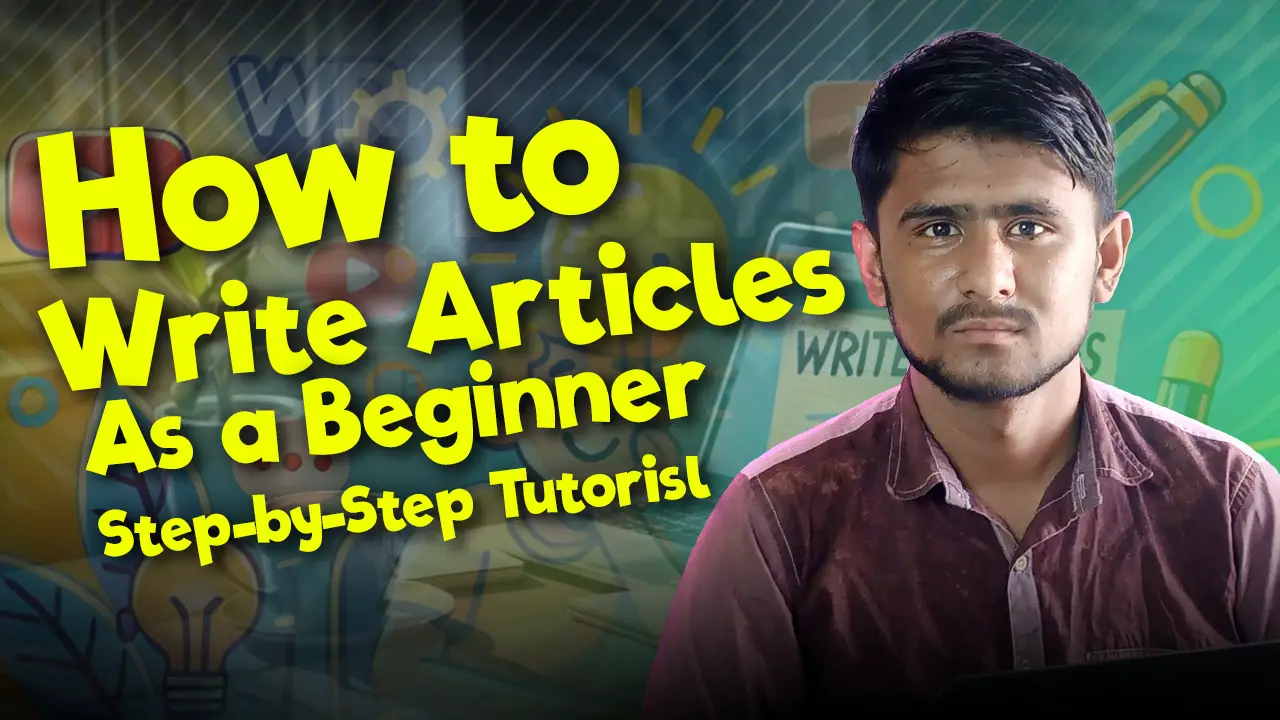Writing quality content can be difficult especially for people just beginning. Many newbies feel overwhelmed when they create their first piece of writing. They aren’t sure how to begin or what tools to utilize. This guide will help novice writers develop the skills to write articles that readers are eager to read. The author of this guide spent years studying how create better writing. He began as a novice also, and he understands the feeling.
What Is an Article?
A piece of writing is writing that informs readers of the subject. Articles may be brief or lengthy. They could be about news, tips on how to approach things, or simply giving ideas. Articles are published in magazines, newspapers as well as websites and blogs. The purpose for an article to present details in a way that is simple to comprehend and engaging to read.
Anyone who writes articles should think about who is going to take them to the readers. Certain articles instruct people on how to conduct themselves. Some articles provide information on current events or news. The best articles can make readers feel something, or they learn something new.
Types of Articles That Beginners Can Write
There are a myriad of articles that writers may try:
- How-to articles that instruct readers how to perform a task.
- Articles on the list that offer suggestions or tips
- Articles in the news that discuss the latest events
- Review articles that discuss the products or services.
- Personal stories that tell experiences
For beginners, it is common to find how-to or list articles simpler to write. They have an organized format that is easy to follow. The writer could begin by introducing an idea he already knows well.
Steps for Writing Your First Article
1. Pick a Topic You Like
If someone is beginning to write the first draft, they should select an area they are familiar with. Writing about topics you love can make the writing more enjoyable. If someone is a cook they could write about simple recipes. If they enjoy films, they can write about their top movies.
The kid who lives across the street wanted to write his very first piece. He is a fan of video games. So, he was inspired to write an article on tips for his favourite game. He was happy to write about something that he was well-versed in.
2. Know Who Will Read Your Article
Before you begin writing, consider the readers of your piece. Are they adults or children? Are they knowledgeable about your subject? Knowing the readers of your audience helps you select the appropriate terms and facts.
Certain articles are written for those who have no knowledge of the subject. Some articles are designed meant for experts who want to gain knowledge. Writers who are new should generally write for novices like themselves. This helps in writing.
3. Do Research About Your Topic
Even if you’re knowledgeable about the topic, doing research will help you make your writing more effective. Research involves finding facts and details from websites, books or talking with others who have knowledge of the topic.
The girl at school was interested in writing about dogs. The dog she had was already hers however she went to the library and discovered three books that covered various breeds of dogs. The content she wrote was much improved due to the fact that she was able to learn new information to give to.
4. Make an Outline for Your Article
An outline can be described as an outline to help you write. It assists you in organizing your thoughts before you begin writing. Writing an outline will save you time and helps you write faster. 4..
A basic outline will include:
- Title: What the article is known as
- Introduction: The introduction which informs the reader about what the article is about.
- Important points: The most important elements of your article
- Final Conclusion: The conclusion which reminds the reader of the fundamental concepts
The teacher of in the center for community writing explains that an outline that is good similar to building a house. You first need a blueprint before you begin building.
5. Write Your First Draft
After you’ve created an outline, you’re now ready to begin writing a draft. A draft is the initial version of your piece. It doesn’t have to be flawless. The aim is to get your ideas down.

Many writers who are new worry too over making mistakes. They strive to get each sentence perfect the first time. This causes writing to be slow and boring. It’s best to write quickly and then fix issues later.
The writer for the local paper claims that she writes terrible first drafts. She simply wants to get her ideas off her brain onto paper. Then, she can edit her writing better.
6. Make Your Writing Better
Once you’ve completed your draft The next step is to make it better. This is essentially going through your draft and resolving any problems. Find:
- Spelling mistakes
- Grammar errors
- Sentences that are difficult to comprehend
- Parts that require additional details
- Words that are frequently used
The act of reading your piece out loud can help you identify problems. Your ears may pick up on things that your eyes do not see. You could request a friend to read your essay and let you know what they think about.
7. Add a Good Title and Introduction
Introduction and title are essential elements in an article. They can make readers want to read on. A great title should:
- What is the article about.
- Keep readers interested
- Do not let it get too long
- Use simple words
The introduction should inform readers why your piece is important to them. It should entice them to read on. Most people only read the introduction and title before deciding whether they want to read the entire article.
Tools That Help Beginners Write Articles

New writers don’t need expensive tools. Simple techniques work for new writers:
1. Writing Programs
Writing programs that are basic in nature are great for beginning writers:
- Microsoft Word
- Google Docs
- LibreOffice Writer
These programs can help you check grammar and spelling. They also automatically save your work to ensure that you don’t lose your work. A teacher in school suggests Google Docs is good for new users because it’s cost-free and simple to use. (Sourse).
2. Note-Taking Tools
A place to store ideas can help writers. The best tools to use are:
- Notebooks
- Apps for phone notes
- Sticky notes
The child that writes tales keeps a tiny notepad in his purse. If he comes across the idea for a story, he notes it down. This helps him recall great ideas for his article.
3. Research Tools
The ability to gather information is essential to write good articles:
- Search engines, such as Google
- Encyclopedias online
- Library books
- Magazines on your subject
The girl who would like to become a writer for science makes use of both websites and books. The author says that books usually have more details, whereas websites offer more recent information.
4. Organization Tools for Longer Articles
Some articles are extremely long and require specialized tools:
- Scrivener
- SmartEdit Writer
- Mind mapping tools
These tools are great for organizing large writing assignments. Many people believe that novices should begin with basic tools such as Word and Google Docs. While learning about new software, writing can be too difficult.
Tips for Better Article Writing
Write a Little Every Day
Writing becomes more effective with practice. Writing a bit each day is more beneficial than writing many times every week. A mere just 15 minutes writing per day can make a huge difference.
The man who creates stories for his grandchildren, writes one page every morning, before breakfast. He claims this little practice has enabled him write numerous stories throughout the decades.
Use Simple Words
Effective writing is written using simple words that anyone can understand. Big words don’t make writing better. They can make writing more difficult to read. If you have to choose between a basic word and a fancy go with the easy one.
The teacher suggests writing as if you’re talking to your friend. Don’t try to make yourself appear clever by using words that people do not know.
Keep Sentences Short
Long sentences are a challenge for readers. Short sentences are simpler to comprehend. Make sure to keep sentences to less than 20 words. Mix medium and short sentences to make your writing engaging.
The editor of the community newspaper says that many new writers create sentences that are that are too long. The breaking of a long sentence into two smaller ones usually helps improve the writing.
Tell Stories and Give Examples
Stories and examples can make an article more entertaining. They assist readers to comprehend and retain the information. When you are explaining something, try to use a real-life example. examples that are real.
The person writing about gardening contains stories about his personal garden. When he speaks about the growing of tomatoes, he recounts the time when birds consumed all the tomatoes before he was able take them home. These small stories make his posts enjoyable to read.
Read Your Writing Out Loud
The act of reading your piece aloud will help you find the problem. If you are struggling to catch your breath when you read an article, it means that the text is long enough. If you are unable to find phrases, others are likely to have difficulty understanding them as well. (Sourse)..
The writer for the school newspaper reads her work aloud before she submits it. The girl says that her ears pick up errors that her eyes do not see.
Common Problems for New Writers

Fear of Starting
Many newbies are scared when they begin writing. They fear that their writing will not be of sufficient quality. The solution is to continue writing. The first article is never flawless. Every article improves.
The writer who is now writing for websites says that his initial articles were very poor. However, no one is able to remember these articles today. They only have the best pieces he writes now.
Not Knowing What to Write About
Sometimes, new writers aren’t able to come up with ideas for topics. If this occurs, try:
- You can make a list of all the things you are aware of
- Checking out other articles for inspiration
- Write about something that has happened to you
- Answering the questions that people have
The instructor of writing instructs her students to keep a notebook with ideas. If they notice something intriguing then they record it as a possible topic for an article.
Getting Stuck in the Middle
Many writers find themselves stuck in the middle of writing an article. They aren’t sure what to write next. It happens to all writers. If you’re stuck:
- Pause for a moment
- Check out your outline
- Go to a different section of the article
- Make sure you write everything even if you think it’s awful
The author claims to be stuck in each book that he writes. He simply says “I’m stuck here” and shifts to another part. Then, he returns and is able to fix the problem.
Feeling Like Your Writing Is Bad
Everyone who is new to writing thinks it is not good enough. This is not unusual. One way you can become better is to continue writing. Every article helps you improve your writing ability to write a little.
The woman of old age who has written numerous articles, says she believes that her work could have been improved. However, now she understands that writers everywhere are like this. But she doesn’t let that stop writers from creating.
Getting Feedback on Your Articles
Feedback involves knowing what others have to say regarding your written work. A good feedback can help you improve. Feedback can be obtained from:
- Family and friends
- Teachers
- Writing groups online
- Comments on articles that have been published
The child who writes his stories is able to share the stories with his peers first. They discuss which parts they enjoy and which ones make them feel confused. This allows him to improve his stories before sharing them with more people.
If you are asking for feedback, make sure you are specific in what you would like to learn. Ask questions like:
- Did the article make sense?
- Which of the parts were unclear?
- Did the introduction inspire you to wish to continue reading?
- Did the end satisfy you?
Conclusion
Writing articles requires the practice and perseverance. Beginning writers should begin with basic topics they have a basic understanding of. Utilizing basic tools such as Word and Google Docs is enough for beginning articles. One of the most crucial things to do is write consistently and not stress about getting it perfect.
Each great writer began at the beginning as a student. The difference between those who are writers and those who aren’t is as simple as: writers continue writing even when it’s difficult. They make bad drafts. They learn from their mistakes. They improve with each new article.
Make sure that your writing is enjoyable. Pick topics you enjoy. Discuss your ideas with other people. Feel proud when you’ve completed your articles even if they’re not flawless. With time and practice writing becomes more efficient and easier.
The path to becoming a professional writer begins with a small step that is writing your first piece. Once you’ve finished, continue to walk ahead, by writing one article at a.




One Comment on “How Beginners Can Write Articles: Tips and Tools for Success”